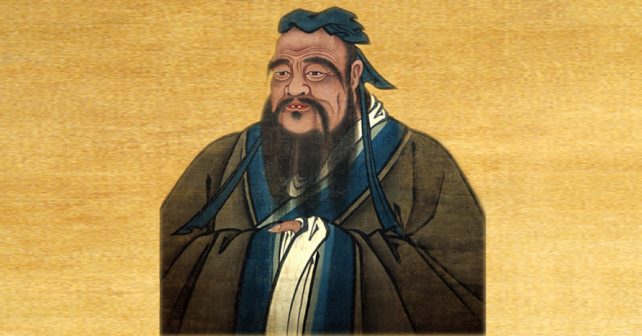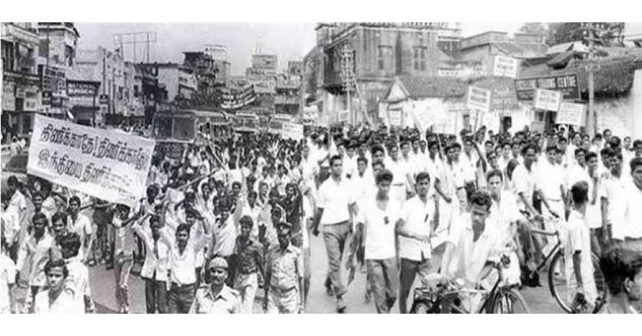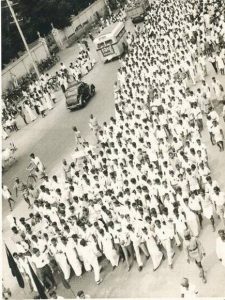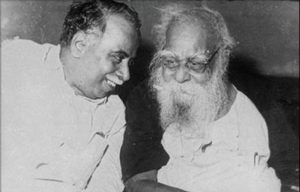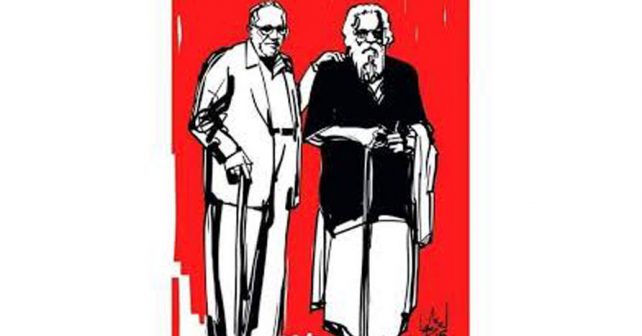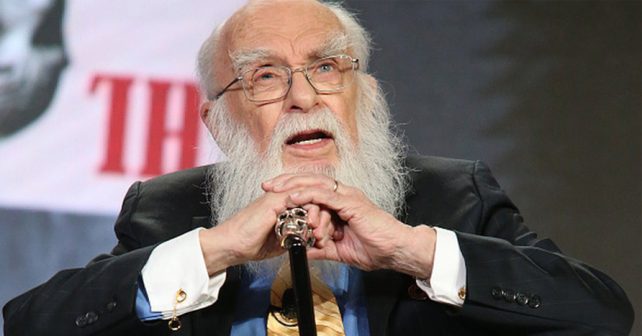A government order that heralded the social justice movement 100 years ago

The social justice movement in Tamil Nadu, which began with the ‘Communal G.O.’, issued 100 years ago on this day by the Justice Party government, has come a long way. The government order, and the successive measures that it spawned over the decades, has proved to be a leveller, empowering non-Brahmins and securing the space due to them in administration and politics.
The order, issued on September 16, 1921, sought “to increase the proportion of posts held by non-Brahmins,” which also encompassed Indian Christians, Muslims and Adi-Dravidars, in the Provincial Services, including the Madras Secretariat. Before issuing the order, a resolution was moved in the Legislative Council.
“This followed in the wake of nearly four years of public education and propaganda on the subject. Prior to this, the Justice Party had demanded that the British constitute communal electorates, so that all communities are represented in the Madras Legislative Council,” said writer V. Geetha.
“They also wanted the franchise to be enlarged. In effect, the demand for reservation was posited as a democratic demand. This was not unlike what B.R. Ambedkar had sought for Dalits, in his appearance before the Southborough Committee in 1919,” she said.
It was P. Thyagaraja Chetti, who captured the aspirations of the non-Brahmins. “We are nothing but slaves in the hands of the Brahmin hierarchy. Let us educate ourselves, and in due course, we shall have our portion of government service and political power, proportionate to our strength and importance,” late Mythili Sivaraman recalled him as saying in her book Haunted by Fire.
Brahmin domination
The domination of Brahmins is summed up by N. Ram, former Editor-in-Chief of The Hindu, in an article in the Economic and Political Weekly in 1979.
“The data put together by the Madras government in 1912 showed that at the higher levels of government service, where Indians were employed, Brahmins made up 55% of Deputy Collectors, 83.3% of Sub-Judges, and 72.6% of District Munsifs,” he said in the article Dravidian movement in its pre-Independence phase.
The analysis of caste composition among those employed in 1917 in the Revenue and Judicial departments, as tahsildars, deputy tahsildars, English head clerks, sharistadars of district and sub-courts, reinforces the same conclusion.
“In higher education itself, a break-up showed that between 1870 and 1918, the proportion of Brahmins among the students enrolled and those granted Bachelor of Arts degrees by the University of Madras was in the range of 67-71%,” he quoted further from government data.
As for the proportion of candidates for the Bachelor of Law degree, Brahmins constituted 73.57% in 1919; and for the Licentiate of Teaching degree, the figure was 73.03%. The proportion was appreciably lower only in the medical field.
Ms. Geetha said the Communal G.O. proved to be a symbolic document, since the actual power of appointment was in British hands, and in collusion with their upper caste, Brahmin colleagues, they scuttled appointments successfully.
“Justice Party leaders were lamenting that the G.O. only existed on paper. Only gradually did the non-Brahmanisation of the services take place, and in fact this picked up speed only in independent India,” she said.
In the name of ‘merit’
She also recalled that it was struck down by the courts, leading to the first amendment to the Constitution.
“It is significant that in 1921, the objections to the G.O. were made in the name of ‘merit’ — that reservation would lead to a loss of merit. And this argument persists to this day, and we see here how merit is linked to birth,” she added.
Impact on composition
According to her, the Communal G.O. impacted the composition of the bureaucracy, and not so much the legislature, and this has been a good thing, on the whole, though we all know that Dalits are mostly in the lower levels of the administration and judiciary, and this situation must change.
She rejected the argument that it had made way for “identity politics”.
“To be represented in a government is a democratic demand, and while it may be advanced on the basis of particular identities, it still relies on the political process, on democratic governance,” she added.
தமிழ் நாடு
100 ஆண்டுகளுக்கு முன்பு சமூக நீதி இயக்கத்தை அறிவித்த அரசு உத்தரவு
பி.கோலப்பன்
சென்னை, செப்டம்பர் 16, 2021 01:08 IST
புதுப்பிக்கப்பட்டது: செப்டம்பர் 16, 2021 01:15 IST
கம்யூனல் ஜி.ஓ.
ஆ
நீதிக்கட்சி அரசாங்கத்தால் 100 ஆண்டுகளுக்கு முன்பு வெளியிடப்பட்ட ‘வகுப்புவாத ஜி.ஓ.’வுடன் தொடங்கிய தமிழ்நாட்டில் சமூக நீதி இயக்கம் நீண்ட தூரம் முன்னேறியுள்ளது. அரசாங்க உத்தரவும், பல தசாப்தங்களாக அது உருவாக்கிய அடுத்தடுத்த நடவடிக்கைகளும், ஒரு சமநிலையானது, பிராமணரல்லாதவர்களுக்கு அதிகாரம் அளிப்பது மற்றும் நிர்வாகம் மற்றும் அரசியலில் அவர்களுக்கு வேண்டிய இடத்தை பாதுகாத்தது.
செப்டம்பர் 16, 1921 அன்று பிறப்பிக்கப்பட்ட உத்தரவில், "பிராமணரல்லாதோர் வகிக்கும் பதவிகளின் விகிதத்தை அதிகரிக்க" கோரியது, இது மதராஸ் செயலகம் உட்பட மாகாண சேவைகளில் இந்திய கிறிஸ்தவர்கள், முஸ்லிம்கள் மற்றும் ஆதி-திராவிடர்களை உள்ளடக்கியது. உத்தரவு பிறப்பிக்கும் முன், சட்டமன்றத்தில் ஒரு தீர்மானம் கொண்டு வரப்பட்டது.
"இது கிட்டத்தட்ட நான்கு வருட பொதுக் கல்வி மற்றும் இந்த விஷயத்தில் பிரச்சாரத்தின் பின்னணியில் தொடர்ந்தது. இதற்கு முன்னதாக, மதராஸ் சட்டமன்றத்தில் அனைத்து சமூகத்தினரும் பிரதிநிதித்துவம் பெறும் வகையில், பிரிட்டிஷ் வகுப்புவாத வாக்காளர்களை உருவாக்க வேண்டும் என்று ஜஸ்டிஸ் கட்சி கோரியது, ”என்று எழுத்தாளர் வி.கீதா கூறினார்.
"அவர்கள் உரிமையை பெரிதாக்க விரும்பினர். உண்மையில், இடஒதுக்கீட்டுக்கான கோரிக்கை ஜனநாயகக் கோரிக்கையாக முன்வைக்கப்பட்டது. இது பி.ஆர் போலல்ல. அம்பேத்கர் 1919 இல் சவுத்பரோ கமிட்டி முன்பு ஆஜராக தலித்துகளைத் தேடினார்.
பிராமணரல்லாதவர்களின் அபிலாஷைகளை கைப்பற்றியவர் பி.தியாகராஜ செட்டி. "நாங்கள் பிராமணப் படிநிலையின் கைகளில் அடிமைகள் தவிர வேறில்லை. நம்மை நாமே பயிற்றுவிப்போம், சரியான நேரத்தில், எங்கள் பலம் மற்றும் முக்கியத்துவத்திற்கு ஏற்ப, அரசுப் பணி மற்றும் அரசியல் அதிகாரத்தின் ஒரு பகுதியை நாங்கள் பெறுவோம், ”என்று மறைந்த மைதிலி சிவராமன் தனது ஹாண்டட் பை ஃபயர் புத்தகத்தில் கூறியதாக நினைவு கூர்ந்தார்.
பிராமண ஆதிக்கம்
பிராமணர்களின் ஆதிக்கம் 1979 இல் பொருளாதார மற்றும் அரசியல் வார இதழில் ஒரு கட்டுரையில் தி இந்துவின் முன்னாள் தலைமை ஆசிரியர் என். ராம் தொகுத்தார்.
1912 ஆம் ஆண்டில் சென்னை அரசாங்கத்தால் தொகுக்கப்பட்ட தரவுகள், இந்தியர்கள் வேலை செய்யும் உயர் அரசுப் பணிகளில், பிராமணர்கள் 55% துணை கலெக்டர்களாகவும், 83.3% துணை நீதிபதிகளாகவும், 72.6% மாவட்ட முன்சிஃப்களாகவும் இருந்தனர். அவர் திராவிட இயக்கம் சுதந்திரத்திற்கு முந்தைய கட்டத்தில் கட்டுரையில் கூறினார்.
1917 ல் வருவாய் மற்றும் நீதித்துறையில் பணியாற்றியவர்களிடையே சாதி அமைப்பு பகுப்பாய்வு, தாசில்தார்கள், துணை தாசில்தார்கள், ஆங்கில தலைமை எழுத்தர்கள், மாவட்ட மற்றும் துணை நீதிமன்றங்களின் ஷரிஸ்தாதர்கள், அதே முடிவை வலுப்படுத்துகிறது.
"உயர் கல்வியில், 1870 மற்றும் 1918 க்கு இடையில், பதிவுசெய்யப்பட்ட மாணவர்களிடையே பிராமணர்களின் விகிதம் மற்றும் மெட்ராஸ் பல்கலைக்கழகத்தால் இளங்கலை பட்டப்படிப்பு வழங்கப்பட்டவர்கள் 67-71%வரம்பில் இருந்தனர்" என்று அவர் மேற்கோள் காட்டினார். அரசாங்க தரவுகளிலிருந்து மேலும்.
இளங்கலை சட்ட பட்டத்திற்கான வேட்பாளர்களின் விகிதத்தைப் பொறுத்தவரை, பிராமணர்கள் 1919 இல் 73.57% ஆக இருந்தனர்; மற்றும் உரிமம் பெற்ற கற்பித்தல் பட்டத்திற்கான எண்ணிக்கை 73.03%ஆகும். மருத்துவத் துறையில் மட்டுமே விகிதம் குறைவாக இருந்தது.
திருமதி கீதா, வகுப்புவாத ஜி.ஓ ஒரு அடையாள ஆவணமாக நிரூபிக்கப்பட்டது, ஏனெனில் நியமனத்தின் உண்மையான அதிகாரம் பிரிட்டிஷ் கைகளில் இருந்தது, மேலும் அவர்களின் உயர் சாதி, பிராமண சகாக்களுடன் கூட்டு சேர்ந்து, அவர்கள் நியமனங்களை வெற்றிகரமாக ரத்து செய்தனர்.
"ஜஸ்டிஸ் கட்சி தலைவர்கள் ஜிஓ காகிதத்தில் மட்டுமே இருப்பதாக புலம்புகின்றனர். சேவைகளின் பிராமணமயமாக்கல் படிப்படியாக மட்டுமே நடந்தது, உண்மையில் இது சுதந்திர இந்தியாவில் மட்டுமே வேகத்தை அதிகரித்தது, ”என்று அவர் கூறினார்.
'தகுதி' என்ற பெயரில்
அரசியலமைப்பின் முதல் திருத்தத்திற்கு வழிவகுத்த நீதிமன்றங்களால் அது தள்ளுபடி செய்யப்பட்டது என்பதையும் அவர் நினைவு கூர்ந்தார்.
1921 இல், ஜி.ஓ. -வுக்கு ஆட்சேபனைகள் 'மெரிட்' என்ற பெயரில் செய்யப்பட்டன என்பது குறிப்பிடத்தக்கது - அந்த இட ஒதுக்கீடு தகுதியை இழக்க வழிவகுக்கும். இந்த வாதம் இன்றுவரை தொடர்கிறது, மேலும் பிறப்புடன் தகுதி எவ்வாறு இணைக்கப்பட்டுள்ளது என்பதை நாங்கள் இங்கே பார்க்கிறோம், ”என்று அவர் மேலும் கூறினார்.
கலவை மீதான தாக்கம்
அவளது கூற்றுப்படி, கம்யூனல் GO அதிகாரத்துவ அமைப்பை பாதித்தது, ஆனால் சட்டமன்றம் அதிகம் இல்லை, ஒட்டுமொத்தமாக இது ஒரு நல்ல விஷயம், தலித்துகள் பெரும்பாலும் நிர்வாகம் மற்றும் நீதித்துறையின் கீழ் மட்டங்களில் இருப்பதை நாம் அனைவரும் அறிவோம். மற்றும் இந்த நிலை மாற வேண்டும்.
அது "அடையாள அரசியலுக்கு" வழி வகுத்தது என்ற வாதத்தை அவள் நிராகரித்தாள்.
"ஒரு அரசாங்கத்தில் பிரதிநிதித்துவம் செய்யப்படுவது ஒரு ஜனநாயகக் கோரிக்கையாகும், அது குறிப்பிட்ட அடையாளங்களின் அடிப்படையில் முன்னேறலாம் என்றாலும், அது இன்னும் அரசியல் செயல்முறையை, ஜனநாயக நிர்வாகத்தை நம்பியுள்ளது," என்று அவர் மேலும் கூறினார்.

